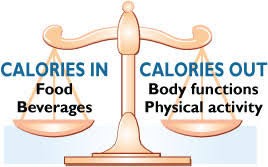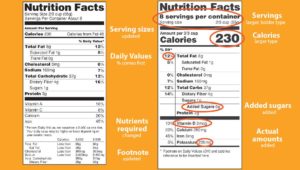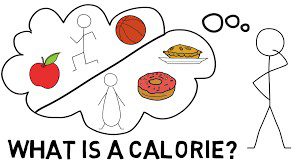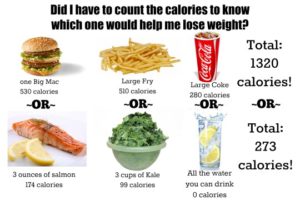Are All Calories Created Equal?
What IS a calorie?
It is the amount of energy required to raise about two pounds of water by one degree Celsius.
The human body needs calories to survive, for without energy our cells would die, and our vital organs would stop. If we consume just the number of calories our body needs each day, every day, we will probably enjoy happy and healthy lives. If our calorie consumption is too low or too high, we will eventually experience health complications.
In nutrition, calories refer to energy consumption through eating and drinking, and energy usage through physical activity. *For example, an apple may contain 80 calories, while a one-mile walk could use up about 100 calories. *(Reference: American Council on Exercise)
What does that mean for your body?
For years, calorie counting has been the best way to track weight loss (or gain). One pound of fat contains 3,500. Logically then, for every 3,500 calories you eliminate, you can expect to drop a pound. But once you have set a goal to eat a certain number of calories per day, how much does it matter from where those calories come? While  salmon has healthier fats than a burger, and a sweet potato packs more vitamin A than regular fries, good nutrition is more than the numbers; it is also about nutrients.
salmon has healthier fats than a burger, and a sweet potato packs more vitamin A than regular fries, good nutrition is more than the numbers; it is also about nutrients.
So…if you only focus on the numbers…is one calorie still one calorie?
The number of calories food contains tells us how much potential energy they possess. Below are the calorific values of the three main components (or macronutrients) of the food we eat:
- 1 gram of carbohydrates= 4 calories
- 1 gram of protein = 4 calories
- 1 gram of fat = 9 calories
Not everybody requires the same number of calories each day. Our ideal calorific consumption depends on several factors, including our overall general health, physical activity demands, gender, weight, height, and shape. A professional athlete who is six-foot tall and aged 25 years needs many more calories each day than a sedentary woman who is five-foot five inches tall and aged 70 years. *Health authorities around the world find it hard to agree on how many calories their citizens should ideally consume. The US government says the average man requires 2,700 calories and the average woman 2,200 per day, while the National Health Service in the UK believes it should be 2,500 and 2,000, respectively. The Food and Agriculture Organization of the United Nations says the average adult should consume no less than 1,800 calories per day.
Food also produces hormonal effects in the body. Some hormones encourage you to store fat, while others encourage the release of sugar. Still others lean toward building muscle. Study after study shows that diets based on the same amount of calories, but different proportions of fat, protein and carbohydrates, result in different amounts of weight loss. *(Reference: Medical News Today).
It is important to note that your body does not always use all of the calories in the foods you eat. *Take almonds, for example. One ounce technically contains 170 calories, but a recent study found your digestive system only soaks up about 129 of those. Nuts are difficult to digest, so little fragments pass right through you, taking tiny bits of fat—and calories—along with them. Almonds are not the only example: research reveals you may not absorb as much as 11 percent of the calories from high-fiber foods, such as fruits, vegetables, and whole grains. It also takes more work to break down certain nutrients, especially protein. When you eat a piece of meat, chicken, or fish, your body has to dismantle the protein piece by piece, into tiny building blocks, known as amino acids. Because that process requires lots of energy, it can take up to six times as many calories to metabolize protein compared to carbs or fat. Even if a bowl of Greek yogurt with nuts and berries contains roughly the same number of calories as a cupcake, you are likely to store more of the cupcake’s calories as fat. *(Reference: American Council on Exercise)
With whole foods, your body has to do the processing and metabolizing, what is known as the thermic effect of food. With highly processed foods, a machine has essentially broken down the nutrients for you, so your body does not have to do much “work” to extract the calories. *In one study, researchers at Pomona College fed volunteers cheese sandwiches, using traditional cheddar on whole-grain bread versus processed cheese on white. Their findings indicate that real cheese and whole grains demanded nearly double the energy to burn, which means that you will burn more calories breaking them down. *(Reference: American Council on Exercise)
Why is it so hard to keep count?
*In one study, published in the Annals of Internal Medicine, researchers found that all people, no matter what their size, are more likely to be able to accurately guess the number of calories in small meals than in large ones. *(Reference: WebMD)
Perhaps instead of counting calories, eat smaller portions. It may seem like a basic concept, but it is easy to forget  that bigger portions have more calories. Many people measure a serving as “the amount we are used to eating,” such as in a restaurant food where meals are served on platters, not average dinner plates. The tendency is that the more we look at (and eat) huge portions of food, the more we see them as normal.
that bigger portions have more calories. Many people measure a serving as “the amount we are used to eating,” such as in a restaurant food where meals are served on platters, not average dinner plates. The tendency is that the more we look at (and eat) huge portions of food, the more we see them as normal.
What to do?
In order to really make each calorie count, enjoy lots of fruits, veggies, whole grains, and lean proteins, filled with fiber and nutrients, which will keep you feeling full longer. Knowledge is Power, and knowing what a bagel, an apple, or a fast-food item contains can help you make better choices. And continue to track the calories, but do not obsess. Instead, focus on quality foods in appropriate portions for your needs.


